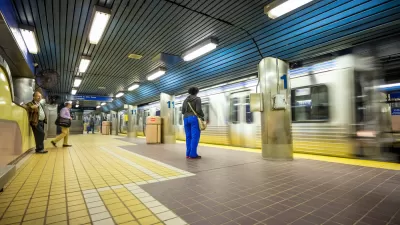Neighborhood Improvement Districts in Philadelphia are facing challenges from a skeptical public for the first time since their introduction over 20 years ago, Alex Vuocolo reports.
Historically, Neighborhood Improvement Districts (NIDs) have a strong track record in Philadelphia. In the 22 years since the designation was first introduced there, the districts – which levy additional property taxes within a defined area to fund improvements – have generally been well-received.
But just within the last year, two proposals for NIDs have been beleaguered with objections in "heated public hearings and petitions." The problem, Vuocolo notes, is that the proposed NIDs encompass broad, nebulous areas that lack the cohesion of distinct neighborhoods – and thus, the commitment of residents to invest in the area as a whole.
The more recent of the two, dubbed the North Central Neighborhood Improvement District (NCNID), tested the already-strained relationship between Temple University and its neighbors. "According to Nick Pizzola of The Temple Area Property Associations, an NID
is the best option to help clean up the area and fund increased
security measures to deal with the ongoing tensions between longtime
neighborhood residents and an ever-revolving crop of students," writes Vuocolo.
In light of these obstacles, Karen Fegely, Director of the city's Office of Neighborhood Economic Development, is preparing a "how-to" guide to ensure that NIDs are better-conceived and presented in the future. Elemental to the process, she points out, is transparency: "It comes down to communication."
Indeed, Pizzola says of NCNID, "There is a sense that that it was a backroom deal."
FULL STORY: Special Taxing Districts Meet Resistance in Philly

Planetizen Federal Action Tracker
A weekly monitor of how Trump’s orders and actions are impacting planners and planning in America.

Restaurant Patios Were a Pandemic Win — Why Were They so Hard to Keep?
Social distancing requirements and changes in travel patterns prompted cities to pilot new uses for street and sidewalk space. Then it got complicated.

Maui's Vacation Rental Debate Turns Ugly
Verbal attacks, misinformation campaigns and fistfights plague a high-stakes debate to convert thousands of vacation rentals into long-term housing.

In California Battle of Housing vs. Environment, Housing Just Won
A new state law significantly limits the power of CEQA, an environmental review law that served as a powerful tool for blocking new development.

Boulder Eliminates Parking Minimums Citywide
Officials estimate the cost of building a single underground parking space at up to $100,000.

Orange County, Florida Adopts Largest US “Sprawl Repair” Code
The ‘Orange Code’ seeks to rectify decades of sprawl-inducing, car-oriented development.
Urban Design for Planners 1: Software Tools
This six-course series explores essential urban design concepts using open source software and equips planners with the tools they need to participate fully in the urban design process.
Planning for Universal Design
Learn the tools for implementing Universal Design in planning regulations.
Heyer Gruel & Associates PA
JM Goldson LLC
Custer County Colorado
City of Camden Redevelopment Agency
City of Astoria
Transportation Research & Education Center (TREC) at Portland State University
Jefferson Parish Government
Camden Redevelopment Agency
City of Claremont



























